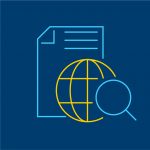
Director
Gaby Umbach
Knowledge plays a vital role in our political, economic and societal life. Deriving from data and various forms of evidence, it has become one of the essential resources in 21st century policy-making. Its strategic relevance increases the demand for reliable knowledge resources in politics. It also calls for scrutiny of its impact on governance transformations. As a consequence, it interlinks evidence and politics as well as knowledge and governance in dynamic ways that deserve our attention and call for research on the interrelations between knowledge, governance and transformations.
Towards the end of the 20th century OECD countries witnessed an ‘evidence turn’ in public policy-making to improve policy and programme development. This turn changed the interrelation between politics and evidence as well as governance and knowledge. It inspired structural and procedural innovation and transformations that impact the way policies are designed, delivered and implemented. The new paradigm of evidence-informed policy-making established expertise-led approaches to rationalise policy-making and public policies. It promoted new policy-making priorities, such as the use of statistics, data and other forms of evidence to inform the policy process; the analysis of policy and programme options; strategic planning and management; performance and outcomes measurement; auditing, impact assessments and evaluation.
Against the backdrop of this development, the research area explores the dynamic interaction between knowledge, evidence, data and governance. It analyses how governance by knowledge and governance of knowledge influence transformations of politics and policies. In doing so, it connects four elements of contemporary societal, political and scientific concern knowledge production and science advice in politics; ethical and normative aspects of knowledge production and quantification; evidence-informed policy-making and governance innovations; the contribution of knowledge and governance transformations to sustainability.
The research area’s activities focus on the role of knowledge, its sources and use in evidence-informed policy-making; responsible and trustworthy evidence and data; data-driven innovation and future-oriented governance; and transformative dynamics between these elements supporting the delivery of the Sustainable Development Goals.
Methodologically, the research area is based on both qualitative and quantitative research and nurtures engagement with the world of practice in all its activities. Its main aim is to shape and facilitate a dynamic, adaptive and engaged research and learning environment for the future-oriented analysis of data, evidence, knowledge, governance and transformations. It ultimately aims to establish a community of research and practice of academics and practitioners dealing with the generation, use and transformation of knowledge and governance for politics and policy-making.
GlobalStat, our well-established open access data gateway, is the data backbone of the research area. It empowers users through knowledge about how we live, which freedoms we enjoy and what limitations we face in our globalised societies. It offers statistical data free of charge from international sources for all 193 UN member states, from 1960 to present day, and presents them in an easy-to-use way.
Major research areas and themes include:
- Knowledge for and in policy-making. We focus on knowledge as a central resource in policy-making, particularly on the use of scientific knowledge and expertise in politics. We have a special interest in data as evidence in policy-making and analyse types and quality of data and evidence used to inform policy design, implementation, evaluation and strategic planning. Guiding questions of our research on knowledge are: What constitutes responsible and trustworthy data and evidence? What type of data, evidence and expertise are relevant for policy-making? What are supply and demand side factors of knowledge production and use in politics? What are their functions and limitations? What knowledge effects does the use of data and evidence have in policy-making? How relevant are transparency, accountability, legitimacy, contestation and politicisation of knowledge production and use in politics? How does innovation in form of computational advancements in data collection and modelling contribute to new forms of knowledge? What types of literacies and capacities does evidence-informed policy-making demand? How can knowledge literacies and capacities for policy-making be strengthened?
- Governance by and of knowledge, data and evidence. We are interested in evidence-informed policy-making; knowledge mobilisation and brokerage; as well as knowledge- and data-driven governance innovations. We analyse abstract and concrete functions of evidence as policy-making instruments and their impact on future-oriented governance; the institutionalisation of governmental science advice and advisory systems; innovation and digitalisation in governance; and the politicisation of policy processes through evidence use. Guiding questions of our research on governance are: How do data, evidence, expertise and knowledge deriving from them inform policy-making? How does the use of evidence impact governance? What is the role of experts in policy-making? How do scientific experts and policy-makers, i.e. scientific and policy communities, interact? What governance effects does the use of data and evidence have? How do evidence-informed policy-making and politicisation of knowledge interrelate? How do governance innovations change governance practices? How are governance innovations, such as digitalisation, used? Can participatory approaches profit from governance innovation?
- Transformations in and through knowledge, governance and politics. We focus on the contribution of knowledge and governance innovations to more sustainable policies and policy-making. We analyse channels through which transformative dynamics between knowledge and governance support better policy-making processes, especially in view of the delivery of Sustainable Development Goals (SDGs). Guiding questions of our research on transformations are: How does the use of evidence in policy-making impact on accountability, legitimacy, transparency, contestation, and politicisation in politics? What are democratic functions and challenges of evidence use in policy-making? Is evidence-informed policy-making supporting the development of epistocracies? How do evidence-informed policies and governance balance the economic, environmental and (somewhat overlooked) social dimensions of sustainability? What is the conceptual core of social sustainability? What are the prospects for social innovation and social investment?
The research area integrates and connects the following activities and cooperation:
- GlobalStat, launched in 2015, is a public information tool on statistics that forms the data backbone of the research area. It facilitates access to data on 12 thematic and three horizontal areas that contribute to the understanding of interrelations between human living conditions and globalisation trends. More than 80 international institutions contribute to GlobalStat, underlining their commitment to the open access to their data. Information on GlobalStat’s data collection and aggregation methods can be found in its Methodological Guide.
- Partnership and publication cooperation with the European Parliamentary Research Service
- Co-leadership of the EUI’s interdisciplinary research cluster on the crisis of expert knowledge and authority
- Leadership of the EUI Applied Data Science for Social Research (ADSSR) working group
- Leadership of Area 3 Policy Frameworks, Governance and Management of Data-driven Innovations of the Data for Policy community
- Leadership of the Working group on ‘Statistical and data literacy in policy-making’ of the International Statistical Literacy Project (ISLP)
- Research for the EU Commission Joint Research Centre’s research programme ‘Enlightenment 2.0’
- Engagement with the EU Commission Joint Research Centre’s Strengthening and connecting eco-systems of science for policy in Europe workshop series
- Participation in expert group of the ESPAS horizon scanning process Futurium
- Leadership of the Berlin Futures – IEP Strategy group on the future of German EU policies of the Institut für Europäische Politik, Berlin




